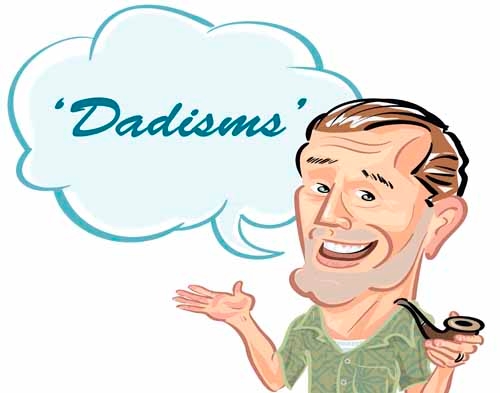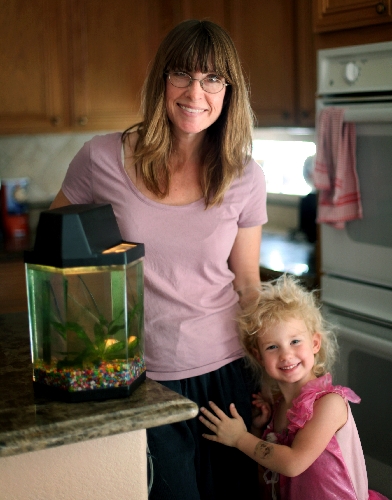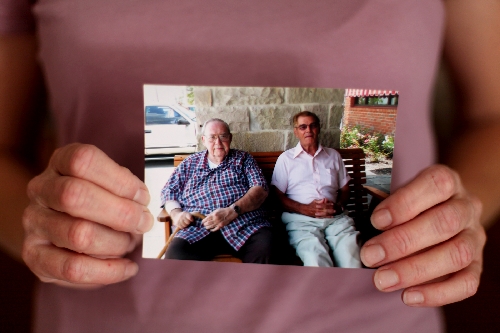Advice, actions prove sometimes father knows best
Don't play God with fish."
It's funny. Succinct. Offbeat. A bit cosmic, even, seeming obvious on the surface but also allowing for deeper interpretation if you think about it a bit.
And, for these reasons, it's one of our favorite new Dadisms.
"Dadism" is a word we're using to describe the collection of things our dads do and say that have, for whatever reason, stuck with us over the years. Or a saying Dad is apt to trot out over and over again to make a point. Or something he'd do - a nervous habit, maybe - that we once found embarrassing or annoying but which, we admit, we also came to love. Or, something Dad once said or did that, for whatever reason, has become a part of family lore.
In celebration of Father's Day, we asked readers to tell us about their own favorite Dadisms. Here are a few of their stories.
FISH WILL BE FISH
Rachel Schmidt writes that she still can remember "the angst" she felt at age 10 when, "upon seeing my female guppy have babies, the other fish in the tank gobbled up the fry. I watched in horror as the young were chased around the water, being eaten left and right."
Schmidt scrambled in vain to transfer the tiny fish to another tank, even as their numbers "dwindled rapidly." Her dad, noticing the drama, offered Schmidt a nugget of real-life perspective.
"The best food for big fish," he told her, "is little fish."
Schmidt wasn't reassured. " 'But they're babies,' I wailed. And, yet, they slowly disappeared."
That's when her dad shared with Schmidt a profoundly meaningful bit of wisdom: "Don't play God with fish."
Schmidt's dad, Melvin Ritter, was recycling in the '70s, "before it was even cool," Schmidt says. He turns 75 in July and still works for the U.S. Environmental Protection Agency in Houston. Schmidt understands today that his words weren't just about the guppies she was trying to save.
Her dad, Schmidt says, "gave his six kids a sense that the world is a place in which we merely share space with everything else" and that "interfering in the natural order of it is difficult, time-consuming and ultimately futile."
It's a perspective Schmidt always has known her dad to have. "It's not like it really stood out when I was a kid," she says, "but over the years, it just kind of sunk in.
"I think if you asked my dad what he meant, I think he'd be very low-key about it. He probably would not want to talk too much about his global philosophy. But I really think that's what he meant."
Schmidt plans to be in Pearland, Texas, today to visit her dad and her mom, Carol. And, for what it's worth, she has kept fish for most of her life.
In fact, after that first depressing guppy experience, she tried again. But, this time, "I got a little tank to hang inside the big one and put the female in it to have the babies," she says. "I eagerly anticipated seeing them all happily swimming alongside Mama.
"She had her babies, all right. And she ate every single one."
WELCOME NEW FRIENDS
Marie Cassidy Skallberg remembers the time that her father, while making a train trip in 1943, met a group of airmen on their way to Omaha, Neb., for flight training.
Skallberg's dad, Jack Cassidy, was returning home from Washington, D.C. - President Franklin D. Roosevelt had appointed him to serve on a wartime board - to spend Thanksgiving with his family.
And, Skallberg says, by the time he and the airmen arrived in Omaha, her dad - "an engaging Irishman" - and the airmen had become friends.
Skallberg's dad invited the airmen to spend Thanksgiving with his family. They were shy at first but stopped by anyway, she says, and "with Irish singing and a wee drop of Jameson plus storytelling, games and, yes, good food, the soldiers relaxed. They, too, had talent singing and playing musical instruments. It was a day of laughter and joy for all of us."
The airmen kept in touch with the family after they left. But, Skallberg says, "we later learned the Omaha Thanksgiving was their last, as their plane went down in battle."
As a memorial to them, and as the start of a new tradition, the family continued to invite servicemen to their home whenever holidays rolled around.
Consider his gracious hospitality a defining Dadism of Skallberg's father, as well as, she writes, his advice to "always have a smile and be open to new friends and experiences. You will gain more than you give.
"That was his credo, and one I have carried on in my life."
CUP OF JOE, OR IS IT MAXWELL?
One of Jim Porter's father's Dadisms was a little routine that he would perform at restaurants.
Howard Porter "was not a drinker," his son writes. "He did not mind if others did, but it was not his thing."
So, Porter says, whenever the family would go out to dinner and the servers would ask if anyone would like a cocktail, "he would always say, 'I'll have a Maxwell House and water, please.'
"The server would then disappear and return with everyone's drink order but his. They would then ask, 'What was it that you ordered?' He would again tell them, very politely, 'Maxwell House and water.' "
The routine would repeat a few more times, Porter says, "before he would tell them, 'If you don't have Maxwell House, Folgers will do.' At that point they realized he wanted a cup of coffee. He would give them a quick wink, and they were now best friends.
"Upon returning to the same venue for dinner, they would bring him his Maxwell House and water on the first try."
MAKE A POINT, MAKE 'EM LAUGH
Jennifer Coleman writes that her dad, Danny Owens, led his household - a household filled with women, by the way; he was the only male around - with "many inspirational talks, a good example and promoting a strong moral code."
But, Coleman says, "his best attribute would be the humor that he brought into the house."
Take the time when, shortly after getting her driver's license, Coleman got her first speeding ticket.
"When I got home and tried to explain to my dad that it really wasn't that bad, he angrily told me that I 'didn't know Jack from the hole in my bum.'
"We both cracked up laughing at yet another hilarious Dadism. Even when he was upset, he couldn't help but say something funny. We still joke about me not knowing Jack."
Coleman adds that her dad, who still lives in Las Vegas, probably would be "so embarrassed to know that this is the Dadism I remember most. But my times spent laughing with him are some of my most treasured times."
LOOK FOR THE LABEL
Tess Kistler's dad, Donald Traub, also has a "great sense of humor," she writes, "especially in difficult situations."
Take the time when Kistler was about 7 and her dad "got pretty sick."
"My mom had a pill for every ailment known to man and had a medicine cabinet that resembled a small pharmacy," she says. "Nothing was ever labeled, but she knew what every bottle contained, or so we thought."
Kistler's mom gave Kistler's dad a pill that she was sure would take care of his symptoms. But, after a few days, he didn't seem to be feeling better. So, he called a doctor and was asked to bring to his appointment any medications he was taking.
"My dad returned home a few hours later with a new prescription for his illness," Kistler says. "As he came into the kitchen, my mom was preparing dinner. Dad sat down at the kitchen table and asked Mom if she wanted to hear the good news or the bad news first."
Mom sat down and asked to hear the good news first. Kistler's dad explained that the doctor had figured out what was wrong - it turned out to be strep throat - and gave him a medicine that was sure to help.
Then Mom asked for the bad news. That's when Kistler's dad - who now lives in Tucson - explained to her that her medication never would have helped him.
"He then went on to explain that the doctor told him that his period would be a little late and he may also have some breast soreness," Kistler says. "My mom had been giving him her birth control pills for his illness.
"My poor dad started hysterically laughing as my mom sat there slightly stunned. He then requested that she leave all original labels on medications brought into the house."
STICK TO THE ROUTINE
Ann Morrison Brown recalls that, when she was growing up during the '60s, her dad, Dr. Robert Morrison, a longtime Las Vegas dentist, had a strange habit.
He would, Brown writes, "get up early every morning to get ready for a full day of seeing patients in his office. After a rousing rendition of 'Teddy Bears Picnic,' he would head to the office. No wonder his patients all loved him."
Brown also still takes to heart this Dadism, which took the form of advice her father often would share: "99 percent of the things you worry about you don't need to worry about. The other 1 percent can be fixed."
Brown's dad now lives in Kentucky. But, she says, "he's still picnicking with the teddy bears at 88."
NEVER MISS A DEADLINE
Cindy Pierre-Morton has her father to thank for never having seen the film "Scarface" in its entirety.
Pierre-Morton saw the movie on her first car date, when she was about 15. But, she writes, her dad, Fred Pierre, "scared my date so bad we had to leave before the end of the movie.
"I don't know exactly what he said, but my curfew was 11 p.m. that night and the movie wasn't going to end in enough time. My date dragged me out of the theater, broke every speeding law in town and even sent the car airborne when we hit a set of railroad tracks.
"I got home with just minutes to spare, but I never saw that boy or the end of the movie again. It's been 30 years now, and I still laugh about that with my dad."
FOUNT OF WISDOM
Kitty Wright's favorite Dadisms come in the form of sayings - bits of advice about a lot of things - that her dad would pass along.
About manners: "Always, always say thank you." Achievement: "Give your best, no matter what. Even if it doesn't work, you'll know you did your best." Life: "Never burn your bridges. You may need that bridge later." Confidence: "Never worry too much about what other people will think. They're usually too busy thinking about themselves." Even about telling a joke: "You can have the funniest joke you ever heard, but if you don't time it right, it'll fall flat on its face. Read your audience and what they are interested in, then give it to them." And talking to boys: "Talking to boys is easy. Just say 'Oh, really? How wonderful! Tell me more.' "
Wright's dad, George Green, died a year ago, five days after Father's Day. And, she says, "I miss him."
To all of our dads, present or departed, happy Father's Day.
Contact reporter John Przybys at jprzybys@ reviewjournal.com or 702-383-0280.



















